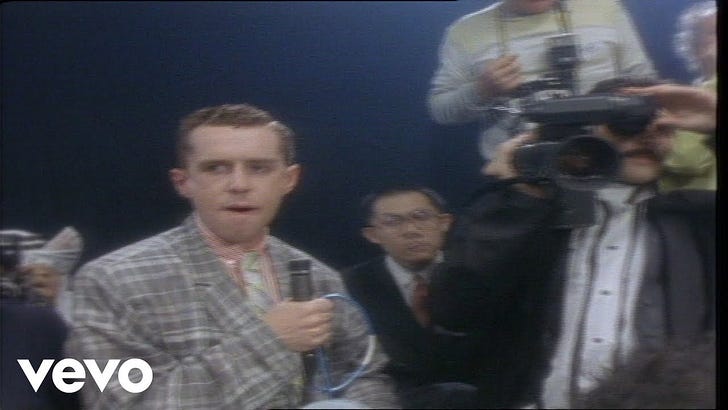It starts with an official voice of warning. Gives way to a dramatic piano, almost from a romantic movie. And again the warning voice as the drums take over: “When two tribes go to war / A point is all that you can score.”
I was working on an essay for my Kerouac back last year on nuclear fear and its impact on the culture and my own art and politics. In particular, I was interested in the punk and new wave music being recorded and released between 1976 and about 1985, when tensions felt highest and TV movies like The Day After were watched by just about everyone.
One of those songs “Two Tribes,” the second single by the English band Frankie Goes to Hollywood, tore up the charts in early 1984. It was a synth-pop classic, a simplistic polemic against war — like Edwin Starr’s “War,” which FGTH would cover on their debut album — that had a beat you could dance to with lyrics that alluded to Ronald Reagan —
Cowboy number one A born-again poor man's son (Poor man's son) On the air America I modeled shirts by Van Heusen
and the threat of atomic weapons:
We got two tribes We got the bomb We got the bomb, yeah Yeah Sock it to me biscuits, now Are we living in a land Where sex and horror are the new Gods? Yeah
“Two Tribes” and its predecessor, “Relax,” were a devastating one-two punch, announcing a potentially game-changing band. The hype machine got rolling as the band issued its debut album, Welcome to the Pleasuredome — an album release 40 years ago this week —feels like a summary of the British music at that time, a music driven by synthesizers, dance beats, and politics, but that can seem on the surface to be empty calories.
Frankie is both more than that and less than that, and Welcome to the Pleasuredome announces this from the beginning, with two pieces that mixes classical and pop sounds, synthesizers and dance beats into a strange dance stew.
The critics, both at the time and in retrospect, rightly describe it as overstuffed and a bit pretentious. The band quotes from romantic English poet Samuel Taylor Coleridge, Tin Pan Alley pop, American horror films, the Moody Blues, and the kind of faux disco-funk prevalent in England at the time.
Listening today is a surreal experience, partly because we are now well past the strange hype that preceded the band — remember “Frankie Says Relax” t-shirts — and can spend time with a record that was a chart smash. Is it worth it?
Well, that’s a difficult question to answer. The record is long and includes far too much filler, especially at the end when it sounds like a pale imitation of Duran Duran or Spandau Ballet. Its highs, though, like “Relax,” “Two Tribes,” the title cut, are thrilling. Its covers — “War,” “Ferry Across the Mersey,” “Born to Run,” “San Jose” — feel weirdly fresh and quite mind-bending. The lows, however, are mostly low because they go nowhere, or worse — like “Tag” — they are inane, or simply unnecessary (“Krisco Kisses” is bad Duran Duran from Duran Duran’s terrible late period).
It’s an album of pulsing beats, political statements, and strangely satisfying kitsch that might lead the listener to assume the whole thing is being presented with tongue firmly in cheek (a la the far superior Adam and the Ants) even as it wears its lack of guile on its sleeve. The whole thing is the opposite of hip, which in this extended period of ironic poses may indeed make them the hippest band of all.



